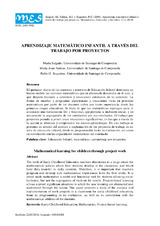Aprendizaje matemático infantil a través del trabajo por proyectos
Mathematical learning for children through project work
Autor
Salgado, María
Salinas, María Jesús
Sequeiros, Pablo G.
Editor
UCOPressFecha
2018Materia
Educación InfantilMatemáticas
Aprendizaje por proyectos
Early Childhood Education
Mathematics
Project-based learning
METS:
Mostrar el registro METSPREMIS:
Mostrar el registro PREMISMetadatos
Mostrar el registro completo del ítemResumen
El quehacer diario de las maestras y maestros de Educación Infantil determina en buena medida las acciones matemáticas que su alumnado desarrolla en el aula, y que después traslada a contextos y situaciones cotidianos de su contorno. La forma de enseñar y programar experiencias y situaciones ricas en procesos matemáticos por parte de los docentes cobra por tanto importancia desde las primeras etapas educativas. Se trata de que las matemáticas supongan para el alumnado una herramienta útil y funcional, que permita la inclusión social, y no únicamente la segregación de los estudiantes por sus resultados. El trabajo por proyectos permite a priori crear situaciones significativas, en las que a través de la acción se abstraen y comprenden los nuevos aprendizajes. En este trabajo se presenta un estudio del análisis e implantación de los proyectos de trabajo en un aula de educación infantil, desde su programación hasta su evaluación, así como su correlación con las capacidades matemáticas del alumnado. The work of Early Childhood Education teachers determines to a large extent the mathematical actions which their students develop in the classroom, and which later they transfer to daily contexts. Therefore, it is important that teachers program and develop rich mathematical experiences from the first levels. It is about made mathematics a useful and functional tool for students allowing social inclusion, but not the segregation of students by results. Project-based learning allows a priori significant situations in which the new learning are abstracted and understood through the action. This paper presents a study of the analysis and implementation of work projects in a classroom for early childhood education, from its programming to its evaluation, as well as its correlation with the mathematical abilities of the students.

